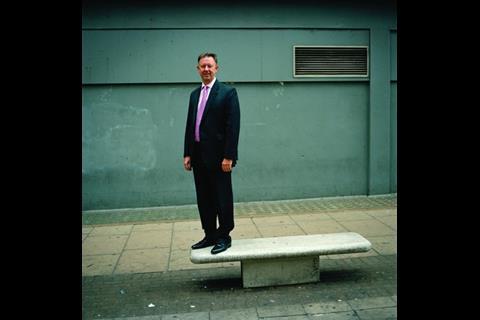Barratt chief executive Mark Clare is adamant that the governmentŌĆÖs targets for fewer carbon emissions and more homes are contradictory. He tells Sarah Richardson why
Mark Clare was seven weeks into his job as BarrattŌĆÖs chief executive when he got a call to tell him that Wilson Bowden was for sale, and therefore that he had the chance to catapult his company into the FTSE 100 and the number two slot in the UK housebuildersŌĆÖ league. ŌĆ£It certainly was sooner than I thought,ŌĆØ he says. ŌĆ£But then, a lot has happened in the past 12 months.ŌĆØ
ClareŌĆÖs assessment, delivered with understated authority from the comfort of BarrattŌĆÖs premises by Oxford Circus tube station on the anniversary of his arrival at Barratt, is on the money. The ┬Ż2.2bn acquisition of Wilson Bowden, finally sealed in April following a struggle with George Wimpey and HBOS, was only the start of an eventful year for Barratt ŌĆō and the housing market in general. Since his arrival in the industry from British Gas last year, Clare has presided over the integration of the two businesses against a background of five interest rate rises, the US sub-prime crisis and, now, a global credit crunch that threatens the UK mortgage market.
The financial turmoil last week led the straight-talking Clare to revise BarrattŌĆÖs volume predictions downwards, despite strong full-year results. But the major difficulty facing the industry, according to Clare, is not simply trouble in the financial markets. The problem is that, while the industry holds its breath to see how long a recovery will take, the government is loading ever more onerous sustainability and affordability targets onto the sector. As he enters his second year at the helm, ClareŌĆÖs message to ministers is clear: make your minds up, because you canŌĆÖt have both.
ŌĆ£Clearly, we are now focusing on the marketplace. You canŌĆÖt ignore five interest rate rises and the current financial turmoil,ŌĆØ Clare says sharply. He is speaking two days after Barratt warned that there would be ŌĆ£downward pressureŌĆØ on volumes and prices. The City likes this way of talking. One analyst said: ŌĆ£You donŌĆÖt get histrionics with Clare.ŌĆØ
But while Clare is concerned about the economic outlook (ŌĆ£nobody knows how quickly the market will recoverŌĆØ), he also has confidence in BarrattŌĆÖs ability to cope with the turmoil. With a quiet assurance, he points out that, historically, Barratt has been good at managing its costs and selling through difficult periods.
This is an opinion shared by the City. BarrattŌĆÖs share price rose after it announced its results, despite the fact that it reported a 5-10% drop in sales for the week the Northern Rock crisis hit. Tony Williams, an analyst at ║┌Č┤╔ńŪ° Value, praised BarrattŌĆÖs candour, and said the company was well placed in a difficult market. He said: ŌĆ£Traditionally Barratt gains market share in a downturn because it ŌĆśsellsŌĆÖ its product.ŌĆØ
The government is saying we need affordable houses and we need to deal with the environment ŌĆ” when you put these together in a market that is less robust than it has been, you have to ask how we square the circle
ClareŌĆÖs first priority for his second year is to ŌĆ£understand how the market is going to changeŌĆØ, and to take action to protect the companyŌĆÖs margins against economic shocks.
Those safeguards include ensuring that the companyŌĆÖs sales capacity is fully used ŌĆō Clare says the company is likely to increase its number of outlets this year. He also stresses that costs will be tightly managed, with the benefits from the acquisition of Wilson Bowden expected to be at least ┬Ż60m in the second full year after the deal. This compares with an initial estimate of ┬Ż40m. ŌĆ£A lot of work weŌĆÖve done on integration in the past few months strengthens our position.ŌĆØ
ClareŌĆÖs big concern, however, is that even with these assets, housebuilders face the impossible task of coping with a tightening market while struggling to deliver the governmentŌĆÖs policy agendas. The target of all new homes being zero-carbon by 2016 requires the costly development of new technologies. At the same time, the government wants 70,000 affordable homes a year by 2010/11, and a total of 240,000 homes each year from 2016 onwards (see table, below). According to Clare, this just doesnŌĆÖt add up.

ŌĆ£The government is saying we need more houses, we need more affordable houses and we need to deal with the environmental challenges,ŌĆØ he says. ŌĆ£I donŌĆÖt think you can argue with any of those, but when you put all of these together in a market that is somewhat less robust than it has been, you have to ask how we square the circle.ŌĆØ
IŌĆÖve spoken to a number of politicians. I really hope housebuilders can sit down with the government and say ŌĆśhow do we do it?ŌĆÖ
Intelligent and erudite, Clare is keen to emphasise that he sees both targets as the responsibility of the sector; on the environment side, Barratt has pumped a lot of cash into developing a prototype zero-carbon home. His gripe is that by going for too much, the government may end up with nothing. ŌĆ£Is it affordability at the moment or the environment? On the environment side, the faster you go, the more costs you incur. On top of that, youŌĆÖll end up using immature technologies.ŌĆØ
He is angered by the governmentŌĆÖs apparent lack of respect for the opinion of industry figures on the issue. ŌĆ£Its approach is to drive the industry to deliver. IŌĆÖd like to see more co-operation, rather than the uneasy relationship that has existed in the past.ŌĆØ
As the Wilson Bowden acquisition demonstrates, Clare does not sit around and wait for progress. He has approached officials over the issue, which he says is necessary to supplement the reviews under way, such as that by former Crest Nicholson chief executive John Callcutt and the Office of Fair Trading. ŌĆ£IŌĆÖve spoken to a number of politicians. I really hope housebuilders can sit down with the government and say ŌĆśhow do we do it?ŌĆÖŌĆØ
Clare says he thinks the government needs to put more money into affordable housing in addition to the ┬Ż8bn recently announced, but beyond this he freely admits he doesnŌĆÖt have the answers. ŌĆ£But I do have observations,ŌĆØ he adds, pointedly. These extend beyond central government to a local level, particularly on planning. ŌĆ£Central government wants us to build more houses, shareholders want us to build more houses and first-time buyers want us to build more houses, but there is a fundamental issue with local authorities.ŌĆØ
As well as the much maligned planning constraints, the other pressing issue is the availability of land. This is expected to drive more mergers and acquisitions and ŌĆō surprisingly given that Wilson Bowden is still being integrated into Barratt ŌĆō Clare says the company is still looking to buy.
ŌĆ£Any opportunities we look at in the future will be more land-based, and a target may not be a conventional housebuilder,ŌĆØ he says, adding that targets are likely to be small, local organisations. ŌĆ£WeŌĆÖd only look at a larger acquisition if it gave us access to land.ŌĆØ
Despite his bullish talk, Clare is keen to demonstrate that his Barratt is very different from the company it was 15 years ago, when it was criticised for poor design and a lack of interest in the communities with which it operated. He says it would be foolish to ignore community engagement. ŌĆ£We are a retailer, really. We just happen to sell the most expensive product you can buy.ŌĆØ





























No comments yet